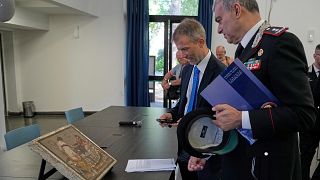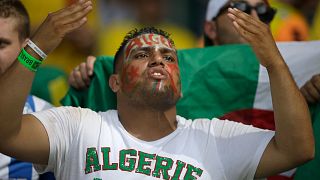Algeria
Algerians largely shunned Thursday the election of their elected municipal and departmental, showing their mistrust of a political system frozen in a sluggish economic and social context.
Mohamed, a 30-year-old unemployed from Algiers, believes that voting “is not for nothing, things will not change”. Kamel, the same age, refuses him to vote “in a country (…) where the old do not let go and cling to power”.
Participation is the main issue of the vote. Only to have a national base and to be represented throughout the territory, the National Liberation Front (FLN), in power since independence in 1962, and its ally of the National Democratic Rally (RND) are assured of to prevail, according to observers.
None of the main opposition parties managed to present lists in more than half of the communes of the country, for lack of a national network, but also, denounced these formations, because of bureaucratic obstacles to the constitution and registering their lists.
At 17:00, the participation rate was 34.46% for the election of communal people’s congresses (APC, municipal councils) and 33.26% for that of the wilaya popular assemblies (APW, county councils), a announced Interior Minister Nourredine Bedoui, up about 6 points from 2012 at the same time.
In the previous local poll in 2012, 44.27% of voters in total had voted for communal and 42.84% for the departmental.
Faced with the lack of alternation, Algerians have gone to the polls in recent years: just over half of voters (51.7%) moved to the presidential election in 2014 and more than a third for the legislative elections last May (35.37%), against 42.9% five years ago.
The local campaign has generated little enthusiasm in this young country, where nearly 45% of the population is under 25, but where 30% of these young people are unemployed and where the political system appears fixed and immutable, involving the same actors for decades.
Algeria also suffers economically from the fall, since 2014, of oil prices, source of 95% of its currencies, which has notably slowed growth and push up inflation and unemployment (12% of the active population) .
In power since 1999, 80-year-old President Abdelaziz Bouteflika, whose entourage publicly mentions a candidacy for a fifth term in 2019, had, on the eve of the poll, called on Algerians to “participate massively”.
Very weak since a stroke in 2013, the head of state, whose public appearances are rare, voted late in the morning in Algiers. In a wheelchair, he placed his ballots himself in the ballot box and affixed his fingerprint on the list of signatures, before leaving without making a statement.
The last offices closed at 8:00 pm (19:00 GMT) and the counting started. Official results are expected Friday afternoon.
Some 22 million voters were asked to choose among about fifty political parties, four alliances and many independent lists, which clashed for the seats of 1,541 municipal councils and 48 county councils.
For the sociologist Nacer Djabi, “it is not through this type of (local) elections that there is a political change to be expected.
While voters are traditionally more inclined to take part in local polls, “issues relating to local development, the role of local communities, have been approached only superficially,” told AFP Belkacem Benzenine, researcher at the Center Research Center for Social and Cultural Anthropology (CRASC) in Oran.
The campaign focused mainly on considerations such as “the difficult economic situation or the presidential election” of 2019, with the expected candidacy of Abdelaziz Bouteflika for a 5th term, he said.
“Vote? Why ?”, Asked Said, 25-year-old computer graphics artist, met by AFP in the popular district of El Madania in Algiers. “I graduated four years ago and I still live on my mother’s housekeeper hooks.”
“I’m a housewife, nobody is interested in housewives so why vote?” Explained Fatima, 57, for her part.
Mohamed Lamari, 77 years old, held, him, to deposit his bulletin in the urn in Algiers. “It’s important, I’ve always voted,”
Fatma Zohra, 40, also voted with her 12-year-old son to “teach him that voting is a duty”.
“Things can only change through voting, the rest has already been given,” she argued, referring to the decade of civil war that killed 200,000 people between 1992-2002.












01:52
Togo’s security forces cast early votes ahead of high-stakes municipal elections
Go to video
Togo suspends French state-owned broadcasters RFI and France 24
Go to video
Protesters gather in Ivory Coast, demand Thiam's return on electoral list
02:13
Cameroon: Police, opposition supporters clash as election looms
01:25
Burundi awaits results of local and parliamentary elections
01:09
United Kingdom backs Morocco's autonomy plan for Western Sahara